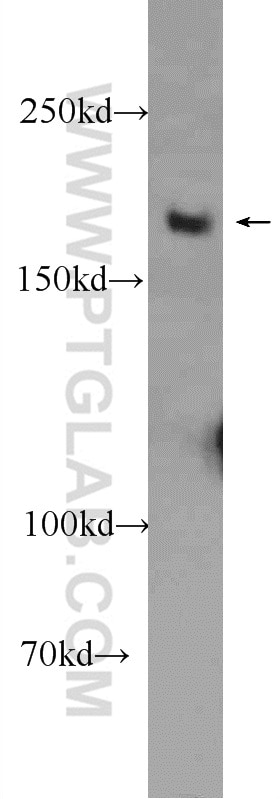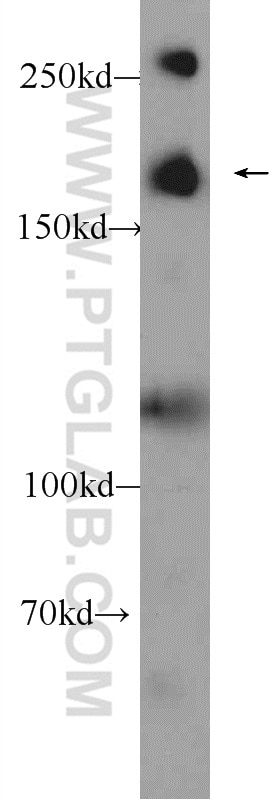Validation Data Gallery
Tested Applications
| Positive WB detected in | MCF-7 cells, HEK-293 cells |
Recommended dilution
| Application | Dilution |
|---|---|
| Western Blot (WB) | WB : 1:200-1:1000 |
| It is recommended that this reagent should be titrated in each testing system to obtain optimal results. | |
| Sample-dependent, Check data in validation data gallery. | |
Product Information
25269-1-AP targets WRN in WB, ELISA applications and shows reactivity with human samples.
| Tested Reactivity | human |
| Host / Isotype | Rabbit / IgG |
| Class | Polyclonal |
| Type | Antibody |
| Immunogen | Peptide 相同性解析による交差性が予測される生物種 |
| Full Name | Werner syndrome, RecQ helicase-like |
| Calculated molecular weight | 162 kDa |
| Observed molecular weight | 162 kDa |
| GenBank accession number | NM_000553 |
| Gene Symbol | WRN |
| Gene ID (NCBI) | 7486 |
| RRID | AB_2879997 |
| Conjugate | Unconjugated |
| Form | Liquid |
| Purification Method | Antigen affinity purification |
| UNIPROT ID | Q14191 |
| Storage Buffer | PBS with 0.02% sodium azide and 50% glycerol , pH 7.3 |
| Storage Conditions | Store at -20°C. Stable for one year after shipment. Aliquoting is unnecessary for -20oC storage. |
Background Information
Werner syndrome ATP dependent helicase (WRN) ,also named as RECQ3 or RecQ protein like 2, is a 1432 amino acid protein, which contains one HRDC domain, one helicase C-terminal domain, one helicase ATP-binding domain and 3'-5' exonuclease domain. WRN localizes in the nucleoplasm and belongs to the helicase family. WRN plays a central role in the repair of methylation-induced DNA damage and has an helicase activity necessary to prevent dramatic telomere loss during DNA replication. WRN gene mutation has an association with Werner syndrome and colorectal cancer.
Protocols
| Product Specific Protocols | |
|---|---|
| WB protocol for WRN antibody 25269-1-AP | Download protocol |
| Standard Protocols | |
|---|---|
| Click here to view our Standard Protocols |

